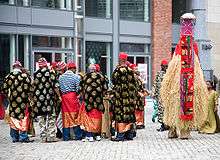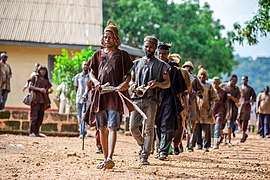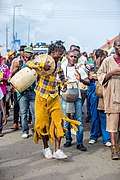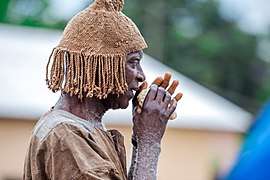New Yam Festival of the Igbo
The New Yam Festival of the Igbo people (Orureshi in the idoma area, Iwa ji, Iri ji or Ike ji, Otute depending on dialect) is an annual cultural festival by the Igbo people held at the end of the rainy season in early August.[1][2][3]

The Iri ji festival (literally "new-yam eating")[4] is practiced throughout West Africa (especially in Nigeria and Ghana)[1] and other African countries and beyond,[5] symbolizing the conclusion of a harvest and the beginning of the next work cycle. The celebration is a very culturally based occasion, tying individual Igbo communities together as essentially agrarian and dependent on yam, the king of crops.[2]
Igbo tradition
Yams are the first crop to be harvested, and are the most important crop of the region.[1] The New Yam Festival is therefore a celebration depicting the prominence of yam in the social-cultural life of Igbo people. The evening prior to the day of the festival, all old yams (from the previous year's crop) are consumed or discarded. This is because it is believed that the New Year must begin with tasty, fresh yams instead of the old dried-up crops of the previous year. [2] The next day, only dishes of yam are served at the feast, as the festival is symbolic of the abundance of the produce.[2]
Though the style and methods may differ from one community to the next, the essential components that make up the festival remain the same. In some communities the celebration lasts a whole day, while in many places it may last a week or more. These festivities normally include a variety of entertainments and ceremony, including the performance of rites by the Igwe (King), or the eldest man, and cultural dances by Igbo men, women, and their children. The festival features Igbo cultural activities in the form of contemporary shows, masquerade dances, and fashion parades. [6]
Ịwa-ji ceremony
Usually at the beginning of the festival, the yams are offered to the gods and ancestors first before distributing them to the villagers. The ritual is performed either by the oldest man in the community or by the king or eminent title holder.[4][5] This man also offers the yams to God, deities and ancestors by showing gratitude to God for his protection and kindness in leading them from lean periods to the time of bountiful harvest without deaths resulting from hunger.[2] After the prayer of thanksgiving to God, they eat the first yam because It is believed that their position bestows the privilege of being intermediaries between their communities and the gods of the land. The rituals are meant to express the gratitude of the community to the gods for making the harvest possible, and they are widely followed despite more modern changes due to the influence of Christianity in the area.[4] This therefore explains the three aspect of Igbo worldview, that they are pragmatic, religious and appreciative.[3]
The day is symbolic of enjoyment after the cultivation season, and the plenty is shared with friends and well-wishers.[4] A variety of festivities mark the eating of new yam. Folk dances, masquerades, parades, and parties create an experience that some participants characterize as "art"; the colorful festival is a spectacle of exhibited joy, thanks, and community display.[2]
Palm oil (mmanụ nri) is used to eat the yam. Iwa ji also shares some similarities with the Asian Mid-Autumn Festival, as both are based on the cycles of the moon and are essentially community harvest festivals.
This event is important event in the calendar of Igbo people all over the world.
The harvest of yam and the celebration of the God of the land through the New Yam festival is an epitome of the people’s religious belief in the supreme deity. The coming of the new moon in the month of August marks the preparation for the great “Iri Ji Ohu” festival, but the time and mode of preparation differs from community to community.[6]
The New Yam festival is a highly captivating art event. The colourful festival is a visual spectacle of coherence, of dance, of joy and feasting, an annual display for community members, to mark the end of the cultivation season, a festival where the people express their gratitude to those that helped them reap a bountiful harvest.
References
- Yam Festival. Retrieved 11-05-2009. Archived April 4, 2009, at the Wayback Machine
- Daniels, Ugo. African Loft. 06-11-2007. Iwa ji Ofu (New Yam Festival) In Igboland!. Retrieved 11-05-2009.
- Onwutalobi, Anthony-Claret. "New Yam Festival - The Official Nnewi City Portal". www.nnewi.info. Retrieved 2015-09-18.
- Omenuwa, Onyema. TheWeek. 11-22-2007. Republished by Philip Emeagwali. Igbo Festival: In Honour of New Yam. Retrieved 11-05-2009.
- "BBC Birmingham - 2005". Bbc.co.uk. 2005-08-06. Retrieved 2012-09-27.
- "The Maiden New Yam Festival (Okuka iri Ji ndi igbo) at Igbo-Ukwu". nacd.gov.ng. Archived from the original on 2016-03-05. Retrieved 2015-09-18.




